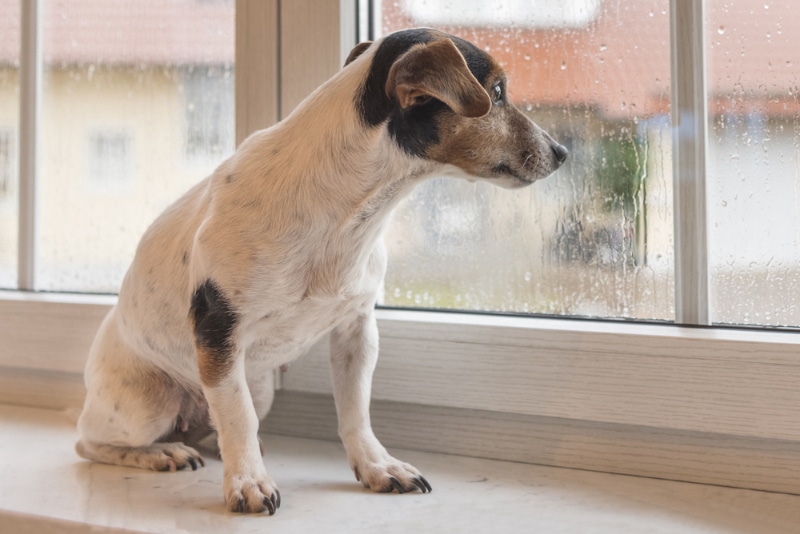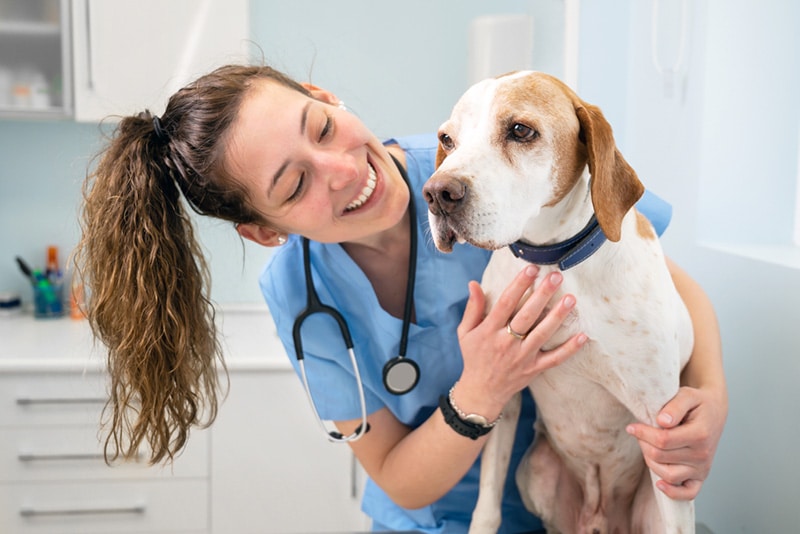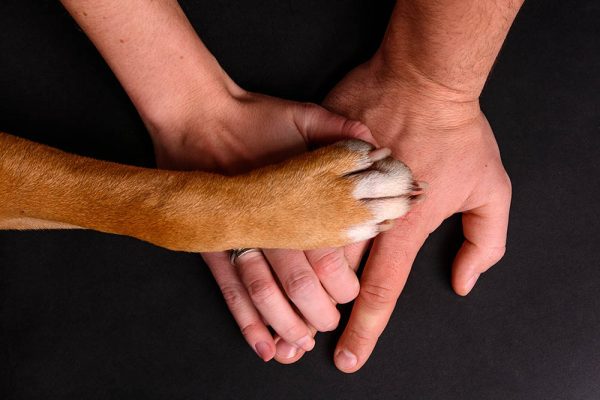Pet owners’ relationships with their animal companions often have a vocal component. Dogs may bark to alert us, whine when excited, or growl when angry. They may also whimper in response to a number of causes, so it’s important to find out what they might be experiencing that’s making them communicate this way.

What Is Dog Whimpering?
To put it simply, dog whimpering is a means of communication. This is a natural behavior that is learned by puppies. More often than not, it begins as a way to express a certain need, like food or a toy. However, there can be various reasons for this behavior.
The 10 Potential Causes of Dog Whimpering
1. Pain

Perhaps the first association you may have with this whimpering is pain. Other telltale signs of pain include loss of appetite, lethargy, and self-protection. Dogs may limp, stand with a hunched back, or not want to exercise with pain. Further investigation is imperative to identify the problem.
2. Illness
Illness can cause similar signs as the previous item on this list. We suggest paying attention to the other signs since they can speed up a diagnosis and, thus, treatment and relief. For example, the urgency of the whimpering can alert you if something is seriously wrong. Likewise, vomiting and GI distress may point to a digestive problem.
3. Fearfulness

Just like people, dogs can experience fear. It may be fear of something they don’t understand or of something they’ve never seen before. Their fear could also be based on prior experiences. Fear can cause a dog to whimper. They may also tremble, whine, or become aggressive. You can try to calm your fearful dog by giving them a safe spot to retreat to, talking calmly to them, and removing them from the situation. Socializing your pup can help them get accustomed to a lot of different situations that can help reduce fear. Counterconditioning and desensitization are some training methods that can help as well.
4. Stress
Dogs can experience stress just like people do. Things like loud noises, strange people, new animals, or a change in environment can all make a dog a little uneasy. They may whimper as a way of communicating that they’re stressed. Other signs of stress you may see are pacing, panting, hiding, or even becoming more aggressive. Stress is best relieved by trying to reduce the triggers and giving your dog a safe place to calm down.
5. Separation Anxiety
Separation anxiety occurs when a dog becomes distressed from not being with their owners or families. It can lead to many unwanted behaviors, including barking, inappropriate elimination, destruction, and self-mutilation. Canines are intelligent animals. They’ll quickly learn the cues that you’re ready to leave the house which may trigger whimpering.
Some breeds are more prone to this behavior than others. How a dog is raised and socialized can also play a significant role. This condition can be trying, requiring the owner’s patience and understanding. We recommend discussing the issue with a vet. They’ll likely do a complete workup to rule out medical conditions. Treatment may involve consulting with a trainer or animal behaviorist or even medication.
If you need to speak with a vet but can't get to one, head over to PangoVet. It's our online service where you can talk to a vet online and get the advice you need for your pet — all at an affordable price!

6. Excitement
Some pups get so excited that they bark and whimper with joy. You might have pulled out the leash, asking your pooch if they want to go for a walk. They may be happy to see you after being away for a while. This behavior might be learned, especially if you or your kids encourage it.
7. Hungry

Some dogs are more food-motivated than others. Shaking a treat bag or opening a can of food will likely elicit a whimpering response in anticipation of getting fed.
8. Attention-Seeking Behavior
Most dogs quickly figure out how to get your attention with actions like whimpering or barking. Even if you merely say no to your pet, they still get what they want from you. Your pup may soon grasp that it also works for other things. If your pooch wants to go outside, they may whimper at the door. They may do the same thing as they paw at their empty bowl.
9. Alerting

Dogs vary in how much they bark. Some pups always seem to have something to say—about everything! Others may only sound the alarm to alert you to danger. You may have trained your pet to be quiet. So, when something rouses their attention, it may cause your dog to whimper instead of bark.
10. Reinforced Behavior
Many items are on this list because they are learned and reinforced behaviors. Your dog whimpers for some reason, and you might respond favorably making them whimper again the next time. Your pup makes associations of cause and effect, not unlike Pavlov’s dogs. Scientists call this behavior modification technique conditioning. It can be positive or negative, and it doesn’t take a lot to make it stick.

How to Care for a Dog That’s Whimpering
Whimpering can be a sign that something is wrong and warrants intervention before it gets worse. This is especially true if your dog starts whimpering suddenly or if it’s accompanied by other signs, like not eating or limping. You may find it helpful to keep a journal detailing your pet’s whimpering and the circumstances surrounding them. Pay attention to any potential triggers, as it will help you curb any unwanted behaviors.
See a vet if you think your dog’s whimpering is caused by pain or illness. Your vet can also help out if your dog is dealing with stress, fear, or separation anxiety. Discuss the matter with your vet if you find the whimpering annoying. They may offer ways to redirect the behavior to something positive. While whimpering isn’t always negative, it can be a sign that your dog is fearful or stressed. This requires prompt action to correct.


Conclusion
A pup that whimpers may be merely seeking attention. However, there is no reason to dismiss it since whimpering can also be related to something more serious. Try to determine what’s behind your dog’s whimpering and see a vet if you have any concerns.
Featured Image Credit: April stock, Shutterstock




















